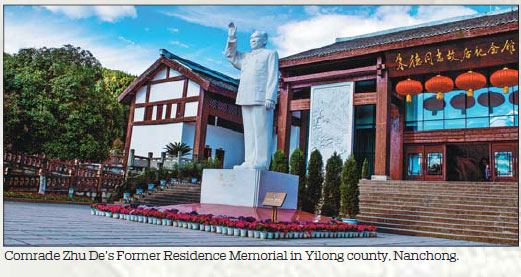Efforts make city complete package for tourists
When crossing into Nanchong from neighboring cities Chengdu and Suining, it's easy to know when you've arrived.
A lush array of cypress trees, lavender-colored shrubbery and neatly close-cut grass greets visitors entering from the west, as a preview of the unique experience to follow. The city, with roots dating back to the early Sui Dynasty from 581 to 618, is becoming more environmentally sustainable and efficient.
"There is so much beautiful scenery here," said Zhao Weisu, a city spokesman. "We feel it's our responsibility for our people and our visitors to preserve it."
Since 2011, the provincial government has stepped up to protect the Jialing River Basin, building 13 of 33 new Sichuan wetlands parks in the city of Nanchong. A national wetland pilot park in Nanchong will be built by 2020, officials said.
Nanchong has also recently built four national-level forest parks, two Taihe Egret Nature reserves and five national-level wetlands parks.
Officials hope the new environmental efforts enhance a city already known for its hospitality and internationally recognized cuisine to draw more tourists.
In Nanchong, finding a spicy hotpot restaurant is about as easy as coming across a cicada or an egret along the Jialing River - they are everywhere. The local cuisine's bold flavors, highlighted by the pungency of garlic, chili peppers, ginger and the citrus-like Sichuan pepper have been replicated across the country and the world as a staple of Chinese gastronomy. But it's best in the province where it originated.
Dishes like mapo doufu (spicy tofu with pork), fuqi feipian (beef stomach in chili oil, with peanuts) and chuanbei liangfen (mung bean jelly in hot sauce), combined with a herbal tea, watermelon juice or cold glass of beer make for a flavorful and memorable gastronomic experience. And while the food is intensely spicy, the laid-back and friendly nature of Nanchong residents is perhaps the cooling contrast that makes this city so delightfully balanced.
Zhao proudly proclaims the people of his city promote a culture of hospitality with "an appreciation for life."
"When you come to Nanchong, you're a friend," he explained. "We're a very welcoming and inclusive city with people who enjoy living here."
The city's tourism attractions have received recognition both nationally and abroad.
Wang Biao, a shadow puppeteer in northern Nanchong municipality Langzhong, continues to practice and teach the traditional entertainment in honor of his late grandfather.
Operating in a 42,000 square-foot facility in Lanzhong's ancient city-one of four ancient cities in China - Wang is frequently asked to perform across the mainland.
His grandfather, Wang Wenkun, once performed at the world-renowned Golden Concert Hall in Vienna, in 1988.
Also in Lanzhong, Nanjinguan Town is one of about 250 tourist attractions in China to earn a five-star government rating as a national tourist attraction, said Jiang Xiaoping, a Lanzhong spokesman.
Its nighttime entertainment, Langyuan Fairyland, features a dozen different performances displaying the area's intangible cultural heritage with song and dance.
At the end of the riveting artistic performances, spectators are left with a view of the Jialing River and the picturesque lights of homes, businesses and watercrafts surrounding it. "It's one of the nicest views in Sichuan," Jiang said. "We encourage our visitors to really pause for a second and take in the view around them."While the Jialing River flows 1,120 kilometers into the mouth of the Yangtze, the roughly 300 km that flow through Nanchong is among the most significant, local officials said.

(China Daily 09/17/2019 page26)














